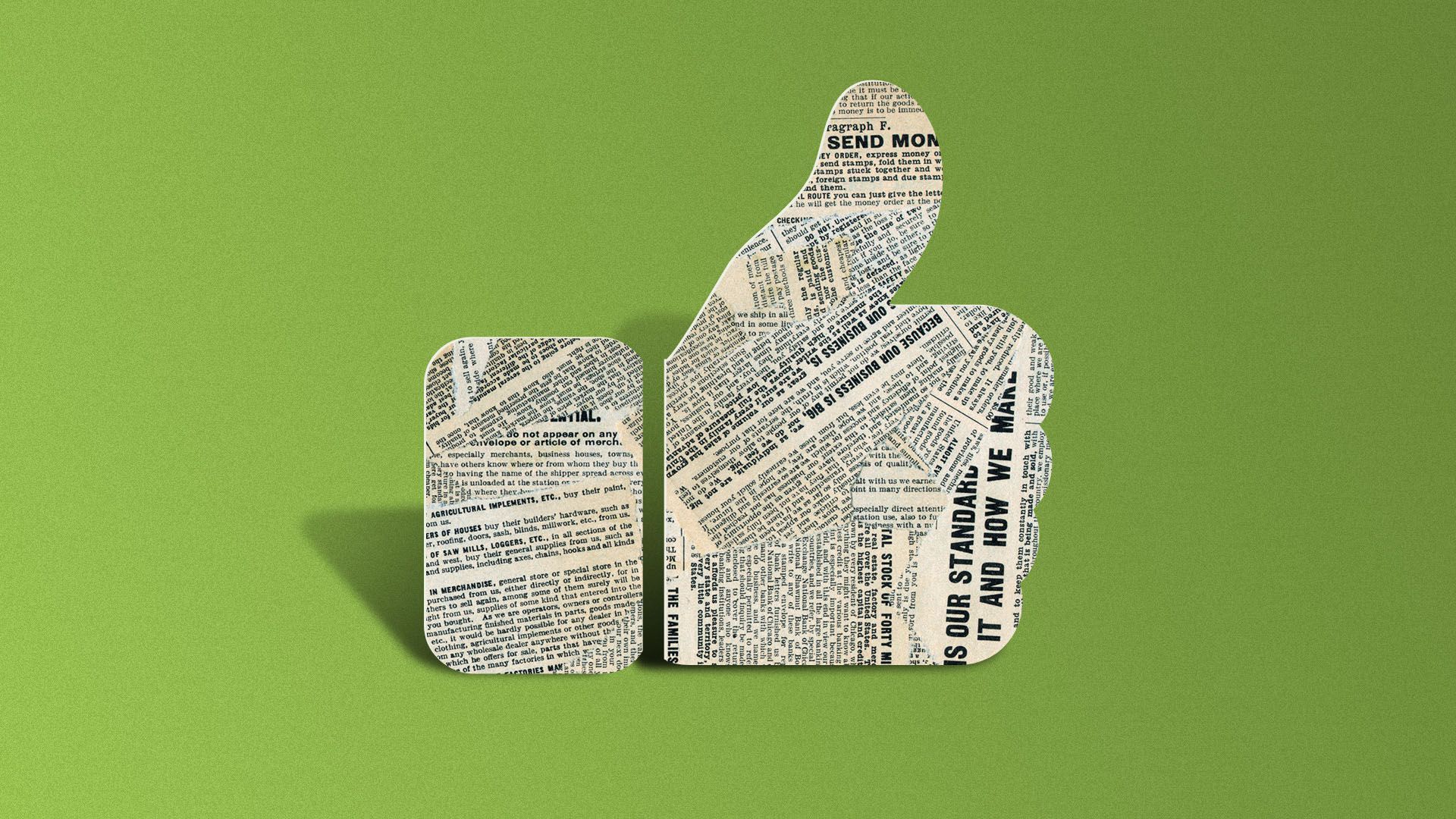News Corp. changes its tune on Big Tech

- Sara Fischer, author ofAxios Media Trends

Illustration: Sarah Grillo/Axios
One of the biggest news publishing companies in the world has slowly backed away from its harsh public criticism of Big Tech platforms, as companies like Google and Facebook have begun to open up their wallets to news companies.
Why it matters: News Corp. has for years been the driving force behind much of the regulatory scrutiny of Big Tech and its impact on the publishing industry. Now it's becoming a beneficiary of the massive pockets of several of the largest tech companies.
Driving the news: News Corp. CEO Robert Thomson put out a statement lauding Google's new efforts to pay publishers around the world more than $1 billion to license and curate their content last week.
- "There are complex negotiations ahead but the principle and the precedent are now established,” he wrote.
- The statement stood in sharp contrast to the reaction from the CEO of the News Media Alliance, a trade group representing newspapers that News Corp. supports.
- "We haven't heard anything good about Google's offers so far, and they seem mostly designed to front-run government actions and lawsuits around the world," said David Chavern, CEO of the News Media Alliance, in a statement to Axios.
Catch up quick: In early 2018, News Corp. Executive Chairman Rupert Murdoch released a newsy statement calling on Google and Facebook to pay trusted publishers a carriage fee for their content — similar to the model adopted between cable companies and TV networks.
- At the time, the notion drew headlines. Neither tech company had been actively paying news companies and neither had invested all that much in news products.
- Today, "the terms of trade truly have changed," Thomson said at the Dow Jones Investor Day in late September.
State of play: News Corp. now has several partnerships with Big Tech firms, including significant paid licensing partnerships with Facebook and Apple News, as well as working partnerships with Amazon, Spotify, Snapchat and Twitter.
- Facebook: CEO Mark Zuckerberg, sitting alongside Thomson, announced last October the creation of the Facebook News Tab, a new, dedicated space on Facebook for curated, vetted news. Reports suggest that News Corp. was offered millions of dollars to participate in the program.
- Apple: The Wall Street Journal is the only national newspaper in Apple News+. Thomson has spoken highly of the Apple partnership, while its rival The New York Times has pulled out of the Apple News program. "It's a younger demographic and it is obviously a source of potential subscribers for us," he remarked on the Dow Jones earnings call in August.
- Twitter: The company has a #WSJWhatsNow partnership, which is in its second year. The "WSJ What's Now" is a new franchise that brings enterprise reporting, business analysis and markets insights to Twitter in a video format.
- Spotify: The company launched its flagship daily podcast "The Journal" in September 2019 with Spotify's Gimlet Media.
- Snapchat: The Wall Street Journal was a launch partner on Snapchat's Discover platform in 2015 and it continues to be a highly-visible participant.
- Amazon: The company has a significant licensing agreement with Amazon's e-book subsidiary Audible.
- Google: While there haven't been any formal partnerships announced between News Corp. and Google, Thomson said at Goldman Sachs 29th Annual Communacopia Conference in September that CEO Sundar Pichai "has shown genuine leadership, and I think personally strongly believes in the value of journalism and that that value has to be represented monetarily."
Between the lines: In 2019, News Corp. launched its own news aggregation service called Knewz. Sources familiar with the effort say it was never intended to be a market threat to Big Tech platforms, but rather putting into reality something the company wanted to invest in as a matter of principal.
- News Corp. says Knewz had 6.7 million monthly uniques in August, compared to approx. 900,000 in February, according to its own Google Analytics metrics.
- Data from SimilarWeb, a third-party metrics vendor, confirms that the app has experienced a huge uptick in visitors, although it reports a little over 2 million monthly uniques in August.
Behind the scenes, the media giant has commented or consulted on numerous investigations into Big Tech's dominance, and is continuing to press for regulatory reform.
- "Obviously, there are a lot of investigations going on in the ad market at the moment. I have no doubt that we will be a beneficiary of the outcome of those investigations," Thomson said at the Dow Jones investor day.
- "And that's not just in the U.S. and Australia, but also in Europe."
The big picture: There was a time several years ago that media companies, with proper investment and scale, could demand big ad dollars via traffic from platforms like Google and Facebook. Today, media companies with value and investment can pull something even more sustainable from those platforms: licensing fees.
- Thomson has said that he believes "there's a recognition now among the platforms about the value of content, and also there's a hierarchy of content."
- [W]hen you combine these deals, they are having a significant impact on our revenue and on our profitability. And it's frankly true for all media companies," Thomson said on the Dow Jones earnings call in August.